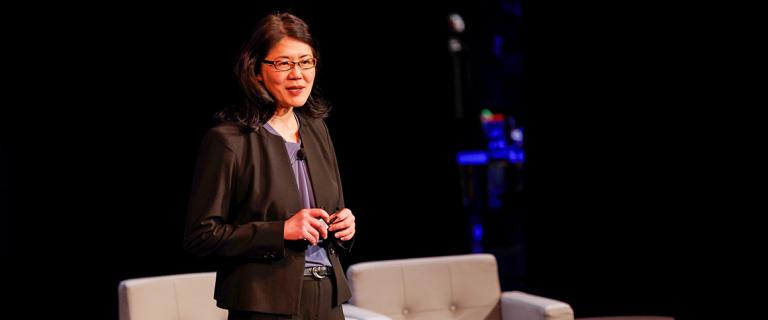
Professor Karen Seto speaks to nearly 800 Yalies who gathered at Lincoln Center in New York City on March 4 for “Cities and Climate Solutions: Catalyzing Change for a Sustainable Future,” part of the ongoing For Humanity Illuminated series.

Professor Karen Seto speaks to nearly 800 Yalies who gathered at Lincoln Center in New York City on March 4 for “Cities and Climate Solutions: Catalyzing Change for a Sustainable Future,” part of the ongoing For Humanity Illuminated series.
Karen Seto, Frederick C. Hixon Professor of Geography and Urbanization Science at the Yale School of the Environment, has been named a lifetime member of the United States Council on Foreign Relations. With her election, Seto becomes the third YSE faculty member selected to join the illustrious foreign policy organization, along with Daniel Esty, Hillhouse Professor of Environmental Law and Policy, and Professor of Environmental Justice Gerald Torres.
“I am honored to join the Council on Foreign Relations, an organization that has done so much to broaden our understanding of international relations and global diplomacy,” Seto says. “I hope that through my membership I will be able to help policymakers and others understand how cities can be catalysts for advancing climate solutions and addressing global sustainability challenges — how they can promote more just, livable, and vibrant communities and play an important role in our efforts to reduce greenhouse gas emissions and biodiversity losses.”
One of the world's leading experts on urbanization and its aggregate global impacts, Seto pioneered the use of satellite remote sensing analysis and other novel methods to study urban land change, forecast urban growth, and examine the environmental consequences of urban expansion. She has done extensive field work in Asia, especially China and India, and was the executive producer of “10,000 Shovels: Rapid Urban Growth in China,” a documentary film that integrates satellite imagery, historical photographs, and contemporary film footage to highlight the urban changes occurring in China. Her book, "City Unseen," co-authored with Meredith Reba ’14 MEM, uses satellite imagery to show how cities shape landscapes and how landscapes shape cities.
“With 70% of the world’s population expected to live in urban areas by 2050, cities offer one of our best opportunities to implement climate solutions at scale,” Dean Indy Burke says. “Dr. Seto is a pioneer and a leader in urbanization science. The Council on Foreign Relations will benefit greatly from her unique insights and commitment to increasing the public’s understanding of the environmental consequences of global urbanization and how cities can be an impetus to address climate change.”
In addition to the Council on Foreign Relations, Seto is an elected member of the American Academy of Arts and Sciences, the U.S. National Academy of Sciences, the American Association for the Advancement of Science, and the Connecticut Academy of Science and Engineering. She chairs the Policy and Global Affairs Division of the U.S. National Academy of Sciences, co-chairs the U.S. National Academies Climate Security Roundtable, established by the direction of Congress to help better understand and anticipate the ways climate change affects U.S. national security interests, as well as the U.S. National Academies Subcommittee on U.S.-China Scientific Engagement. She was the coordinating lead author and co-led the chapters on how cities can mitigate climate change for two U.N. climate reports, the IPCC 5th (2014) and 6th (2022) Assessment Reports. Seto has served on many U.S. National Research Council (NRC) Committees, including the NRC Committee to the Advise the U.S. Global Change Research Program and the NRC Committee on Pathways to Urban Sustainability, and has received numerous awards for her scientific contributions, including the Outstanding Contributions to Remote Sensing Research Award from the American Association of Geographers.
Established in 1921, the Council on Foreign Relations is an independent, nonpartisan membership organization, think tank, publisher, and educational institution dedicated to being a resource for its members and informing the public about the foreign policy choices facing the United States and other countries around the world. The council publishes the widely circulated and highly regarded international affairs magazine Foreign Affairs and runs the David Rockefeller Studies Program, which influences foreign policy by making recommendations to the presidential administration and diplomatic community and testifying before Congress.